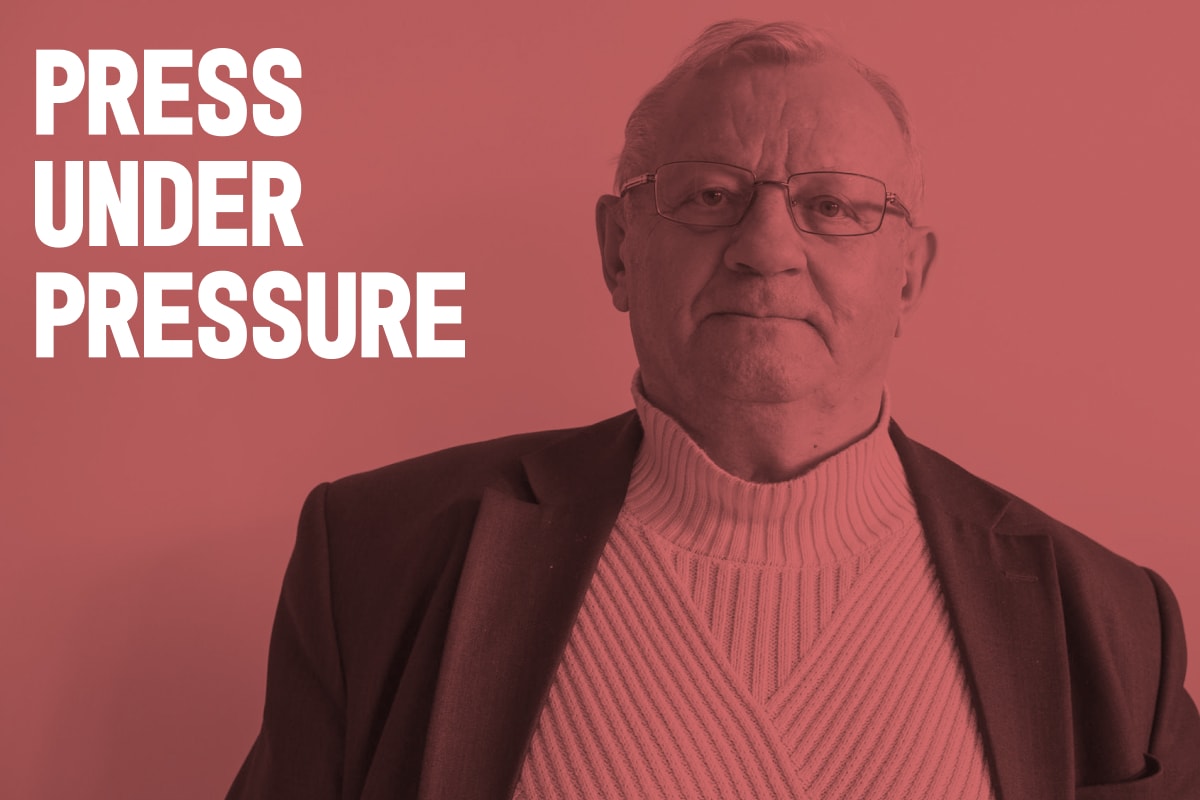
Since August 9, 2020 four large independent newspapers in Belarus have been unable to freely print and distribute their publications in the country. These include Komsomolskaya Pravda in Belarus, Svobodnye Novosti Plus, BelGazeta and Narodnaya Volya. Moreover, Belpochta excluded all four editions from the subscription catalog for the first half of 2021.
In October 2020, we talked with Iosif Seredich – about the blockade and opportunism of the authorities; the thorny matters of printing and distribution; about how the editorial office is working now; and why people support the newspaper.
Narodnaya Volya wouldn’t be what it is today if it didn’t cover breaking news and urgent issues. So we decided to change neither our format nor our policy either before or after the elections. Of course, the newspaper was publishing red-hot material, but I could never have imagined the things that actually happened.
I came to work on the morning of August 20 or 21, and I saw no fresh issue of Narodnaya Volya on my table, although it had been delivered to the printing house the day before on schedule and without any problems. I called the director general of the Belarusian Press House and asked him what had happened. He told me, “Iosif, the printing press has broken down.” Needless to say, I could not hold my tongue and told him, “It is not the printing press but the brains of those who are trying to stay in power, backed by bayonets, which have broken down.”
Indeed, what was he even talking about? First of all, the printing press of the publishing house belongs to the Presidential Property Management Directorate. There are dozens of presses there. Second of all, why would the printing press break down for Narodnaya Volya alone?
How come? Was Sovetskaya Belorussia, the newspaper of the presidential administration, printed? It was. Were all the other newspapers which are part of the presidential administration conglomerate printed? They were. Unlike Narodnaya Volya. However, this was not the issue that outraged me most. Had the director of the publishing house, who also manages the printing house, informed me the day before, when we had delivered the issue to print, I would have solved the problem within an hour. What cynicism! They didn’t even bother to inform us, although we delivered the newspaper on time.
I failed to reach agreement with alternative printing houses. Either they looked at the stories delivered, or some kind of “consultation” was received, but the answer was always negative: “No, we will not print Narodnaya Volya.”

Iosif Seredich
We had been publishing the newspaper in Lithuania for many years, but when Lithuania joined the European Union, and the border control became even more strict, we could not deliver the print run to Belarus overnight. We went to Smolensk in Russia, where a federal printing house is located. As early as when Yeltsin was in office, we started printing Narodnaya Volya in a Russian printing house, and it lasted for five years.
The newspaper would often be seized and sent to police stations. But I must state that we have not failed to print an issue in 25 years. We faced pressure and even terror from our authorities dozens of times, but the maximum delay was a day or two, and then the newspaper was delivered to Minsk and distributed throughout Belarus. We met our schedule.
We are currently publishing the newspaper in a private company that has its own printing house near Moscow.
By the way, after talking to the director general of the Belarusian Press House, I sent a telegram to the Head of the Administration of the President of the Republic of Belarus stating that an issue had not been printed under a false pretext. I mentioned “a false pretext” in the telegram because citing a broken printing press was just an outright lie. Two days ago, I sent a detailed letter by registered mail saying that Narodnaya Volya, a non-state, independent, democratic newspaper, had been being published in Moscow, instead of Minsk, for three consecutive months already, which was a disgrace. And this is a disgrace – but for the country rather than our editorial office. I also asked once again “to take immediate action and solve the problem.” I haven’t received any replies yet.
As soon as we printed the first issue in Moscow and delivered it to Minsk, I sent the entire print run to Belsoyuzpechat and Belpochta [national distributors], and they accepted it. I thought that the issue would be with our subscribers and in kiosks for those who buy it in the morning. But the morning comes, and I see no newspaper in the kiosks: subscribers don’t get it either. I contact both organizations.
The newspaper lay two more days with them, unavailable to readers. Then Belsoyuzpechat and Belpochta told me to take the print run and distribute it as I saw fit, because they refused to do it. There were situations when other newspapers failed to keep to schedule, and the delivery vehicles left without waiting for their print runs to be ready, and no one made a big fuss about it. That’s why in our case no one would have paid attention to the delay, unless there was a direct ban from Belpochta and Belsoyuzpechat. We could have taken this issue and the next one and deliver them together to both subscribers and customers on the street.
But when they did not take the run we had printed in Moscow for distribution, we understood that the authorities had deployed a targeted repressive blockade. That was the pivotal moment. Within a day, we created a volunteer network, which is not just expanding, but multiplying day by day. As of now, we have over 300 volunteers.
The only problem is that we can’t reach each and every one of our subscribers as there are thousands of them. And Belpochta refuses to provide us with the list that would contain their names and addresses, so we cannot not know that somewhere in a village there is so-and-so who is our subscriber and is waiting for his issue to be delivered.
When the same blockade happened dozens of years ago, we organized a subscription system, but we had all the addresses back then. Every night, the editorial office would turn into a post office: a group of students, pensioners, hired staff and editorial staff sat there sealing each copy of the newspaper in a large envelope and putting a stamp on it and ensuring that the copy should go to the subscriber. In the morning, we would take the bags full of newspapers to the railway post office, tip them onto a common conveyor, pay extra for delivery, and the postal service would deliver those newspapers to our readers as letters.
If the blockade prevails, we will have to find another solution. We are already notifying our readers that they can subscribe to the newspaper through a payment system.
I can see the moment when private organizations will be created to deal with the delivery, subscription, and distribution of newspapers. It’s ridiculous that all the small news kiosks over the country are owned by the state. I know dozens, maybe even hundreds, of kiosk keepers in Minsk who would eagerly take the newspaper if they owned the kiosk, because it’s money. Unfortunately, kiosks belong to the state, and the state in its turn belongs to its sovereign, whom we all know. The fact that news kiosks in Belarus are state property is absurd.
I don’t know how long it will last, and how long we will last, but our newspaper is currently being published by the people alone. When we lost our income, we addressed our audience on the pages asking them for help in return if they valued the newspaper. This is not merely a donation: rather, direct assistance to the editorial staff in publishing.
Moreover, many people come to our office to buy a newspaper here. Sometimes they buy more than one copy, stocking up for their neighbors, relatives, acquaintances – thirty, fifty, one hundred copies. This is another source of income.
The creative part of the editorial board’s work has not changed a bit. Last week I was invited to see the Minister of Information, Mr. Lutsky, who started another conversation about how the newspaper criticises the authorities very harshly. The authorities are naturally not happy about this.
I replied that during the same tough times earlier, either a presidential advisor or the head of the administration would have approached me saying the authorities had been unhappy with my newspaper and asking what I was going to do about it.
I would have answered them the same I was going to answer him, “The newspaper has always been published in compliance with each and every legal act. The newspaper will be published on the basis of our legislation and the moral principles of employees, staff, and editor-in-chief.”
We’re not going to serve anyone today. We are not a party body. We are not a body catering to the financial interests of a bunch of oligarchs. We are a private, independent, democratic newspaper.
We stand in solidarity with our colleagues, and we have expanded our editorial staff. For example, TUT.BY [the country’s major online news portal] had its media status revoked, so its journalists and photojournalists do not have the opportunity to participate in and cover events. We are a media organization, and we stand in solidarity, so I issued an order and included some of them in our editorial staff, gave them new press cards.
As a result, today they can offer coverage of the mass protests, and many of them have documents confirming their employment with Narodnaya Volya. However, they have also been detained and convicted – in Gomel and in Minsk. So it goes: this is the fate of the press today. The only thing that matters is that we do not feel ashamed later for having retreated, stepped aside out of fear.
The print press still has a significant audience. Hundreds of people contact me today. These people are mostly of mature age, because young people prefer new technologies more, while the middle-aged still want to hold a newspaper in their hands, and they represent a significant part of the population.
This newspaper can also later be passed from hand to hand. On the front page of every issue we put a slogan over the name of the newspaper that reads «Read and pass on». Thus, one copy of the newspaper can be read by tens, if not hundreds, of people, until it finally wears thin.
The authorities have their own printed newspapers, but they are all biased, and our newspapers – independent, non-state ones – expose their fraud and their lies. To avoid such revelations, the authorities crack down on these few democratic newspapers.
After all, when the population see no counterarguments; when they don’t even know there might be the other side to the story, a different point of view, or another perspective; it is easy to zombify them, and beat anything the authorities want into their heads.
They clearly believe that if they close down the few printed newspapers, there will only be state television, state radio, and state newspapers left, and people will have no other perspective…
Terms and conditions
Partial or full reprint is permitted subject to following terms of use.
An active direct hyperlink to the original publication is required. The link must be placed in the header of the reprinted material, in the lead or the first paragraph.
Reprints, whether in full or in part, must not make changes to the text, titles, or copyrighted photographs.
When reprinting materials from this page, attribution must be given to the Press Club Belarus “Press under Pressure” project, collecting evidence of repression against independent media and journalists in Belarus.